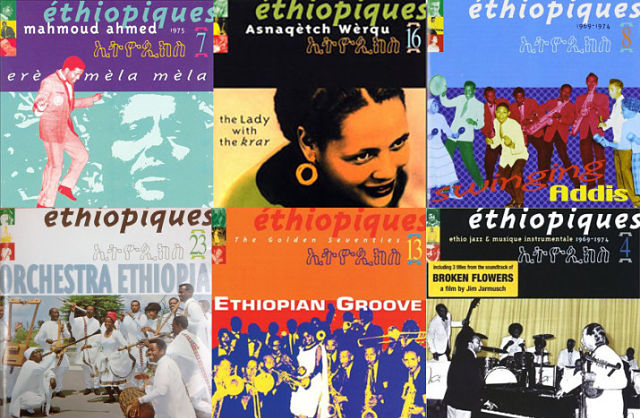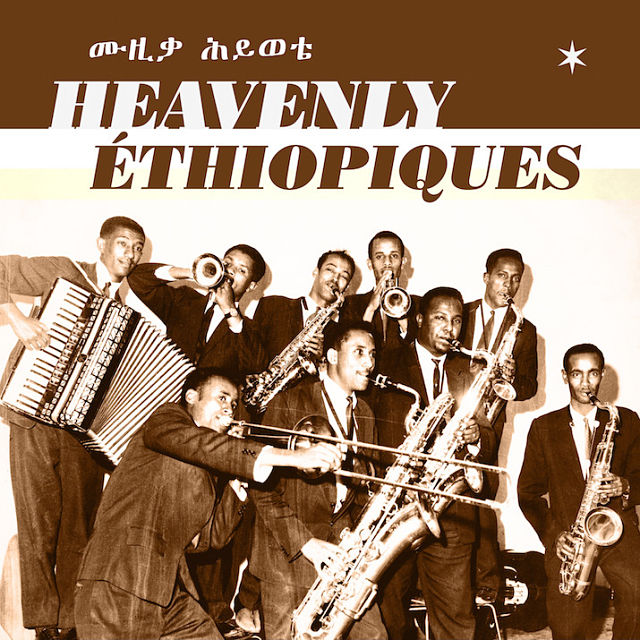 Éthiopiques album covers. (Photos: Buda Musique)
Éthiopiques album covers. (Photos: Buda Musique)
BY ABEL SHIFFERAW
It’s 2000 something. I’m holed up in my bedroom searching for samples to chop up on Fruity Loops. While deep into the free-market jungle of Amazon’s suggested music section, I stumble across a compilation of Ethiopian music with faded pictures of nine dudes jamming in white suit jackets. I press play on the 30 second sample.
My mind races with the opportunities these breakbeats offered a budding beatmaker. Catchy organs, swinging horns, funky guitar riffs, soulful melodies and grainy and pained vocalists swoon over love lost and gained. Sung in my mother tongue—Amharic—this was a far cry from the corny synthesizer music of the 1990s that my parents played on Saturday mornings. I could actually sample this shit.
The next day, I burn a CD and pop it into my dad’s car. His eyes light up when the first notes ooze out of the speakers.
“Where did you get this?” He asks puzzlingly.
“The internet,” I respond smiling.
In the 1970s my dad was one of thousands of high school students in Addis Ababa protesting the monarchy. The protests eventually created instability which lead to a coup d’état. The monarchy was overthrown and a Marxist styled military junta composed of low ranking officers called the Derg came to power. The new regime subsequently banned music they deemed to be counter revolutionary. When the Derg came into power, Amha Eshete, a pioneering record producer and founder of Ahma Records, fled to the US and the master recordings of his label’s tracks somehow ended up in a warehouse in Greece.

Heavenly Éthiopiques cover. (Photos: Buda Musique)
Fast forward, 1997. The Paris-based record label Buda Musique, stumbles upon a collection of decades old Ethiopian music and releases Éthiopiques Volume 1: The Golden Years of Modern Ethiopian Music, a compilation of largely forgotten songs from an extraordinary period of musical experimentation. Funk, soul, jazz, rock—popular western and traditional Ethiopian music ground together into a dizzyingly fresh sound with subtle scents of bunna (coffee in Amharic) breezing through the music’s notes.
At the forefront of this musical explosion was Mulatu Astatke, the legendary jazz musician, who expertly meshed jazz and traditional Ethiopian melodies with a sprinkle of Latin-influenced rhythms. The result: Ethio-Jazz, a sweepingly beautiful sound of a certain unique tonality.
Buda Musique has released 29 Éthiopique compilations to date with gems on gems throughout the collection, ranging from traditional Ethiopian music while some focus on specific genres or highlight the works of certain artists such as Alemayehu Eshete, Asnaketch Worku, Mahmoud Ahmed, and Tilahun Gessesse. None of the compilations within the series feature the more contemporary synthesizer-based Ethiopian pop music.
The Éthiopiques series, made possible by an unexpected but beautiful cross-cultural exchange of extraordinary proportions, has naturally caught the attention of music-heads, audiophiles and producers alike. And with that brief history in mind, I present to you a list of ten modern tracks, all made in the new millennia, that have sampled Ethiopian music, expanding even further the deep multicultural history of Ethiopian, and by extension, all music.
—
Related:
Amha Eshete & Contribution of Amha Records to Modern Ethiopian Music
How Ethiopian Music Went Global: Interview with Francis Falceto
Join the conversation on Twitter and Facebook.

























